Did you know? The average person makes over 70 beverage choices each week, with these decisions potentially impacting up to 20% of daily caloric intake and nutrient absorption. Choosing healthy drinks matters for your overall health.
Beyond hydration
What you drink affects your health just as much as what you eat. Every sip can either help or harm your body, depending on your choices.
Healthy beverages contain minimal added sugar and artificial ingredients while offering beneficial compounds that support your body’s functions. This guide explores various nutritional drinks packed with health benefits to help you make informed choices for your daily hydration.
You’ll discover different categories of beverages and their specific advantages for your health, from improving heart function to supporting digestion and boosting immunity.
The undisputed champion: water
Essential for life
Water supports nearly every bodily function. It helps:
- Transport nutrients to cells
- Remove waste products
- Regulate body temperature
- Support proper digestion
- Maintain blood volume
- Keep joints lubricated
Water quality matters
Filtered water removes potential contaminants while preserving beneficial minerals. If using tap water, check your local water quality report for safety.
Mineral water contains varying levels of calcium, magnesium, and sodium, which can contribute to your daily mineral intake.
How to check your hydration status
| Hydration Level | Urine Color | Thirst Level | Energy Level | Other Signs |
|---|---|---|---|---|
| Well-hydrated | Pale yellow | Minimal | Good | Regular bathroom visits |
| Mildly dehydrated | Dark yellow | Noticeable | Slightly decreased | Dry lips |
| Dehydrated | Amber/honey | Strong | Low | Headache, dry mouth |
Plain water vs. enhanced waters
Plain, filtered water remains the gold standard for hydration. Enhanced or vitamin waters often contain added sugars or artificial sweeteners that can offset any potential benefits.
Tips for staying hydrated
Make water more appealing by adding natural flavors:
- Cucumber slices with mint leaves
- Citrus wedges (lemon, lime, orange)
- Frozen berries as ice cubes
- Fresh herbs like basil or rosemary
Hydration needs by activity level
| Activity Level | Daily Water Intake (approximate) | Signs You Need More |
|---|---|---|
| Sedentary adults | 8-10 cups (2-2.5 liters) | Dark urine, dry mouth |
| Moderately active | 10-12 cups (2.5-3 liters) | Post-activity thirst, fatigue |
| Very active/athletes | 13+ cups (3+ liters) | Performance decrease, headache |
| Pregnant/breastfeeding | 10-13 cups (2.5-3.2 liters) | Constipation, fatigue |
Adjust based on climate, personal needs, and health conditions.
The power of the leaf: teas and their myriad benefits
Optimal tea brewing guide
| Tea Type | Water Temperature | Brew Time | Tips for Maximum Benefits |
|---|---|---|---|
| Green | 175°F (80°C) | 1-3 min | Don’t use boiling water; damages catechins |
| Black | 200-212°F (93-100°C) | 3-5 min | Can handle full boil |
| White | 175-185°F (80-85°C) | 4-5 min | Gentlest processing; handle with care |
| Oolong | 185-205°F (85-96°C) | 3-5 min | Re-steep good quality leaves 2-3 times |
| Herbal | 212°F (100°C) | 5-7 min | Longer steeping releases more compounds |
Green tea
Key Bioactive Compounds: EGCG (epigallocatechin gallate), catechins, and L-theanine
Specific Health Benefits:
- Reduces inflammation throughout the body
- Boosts metabolism and supports healthy weight
- Protects cells from damage with powerful antioxidants
- Supports brain function and focus
- Improves cholesterol levels and blood pressure
Research suggests that 2-3 cups daily provides optimal benefits. Studies indicate regular green tea drinkers have lower risk of several chronic diseases.
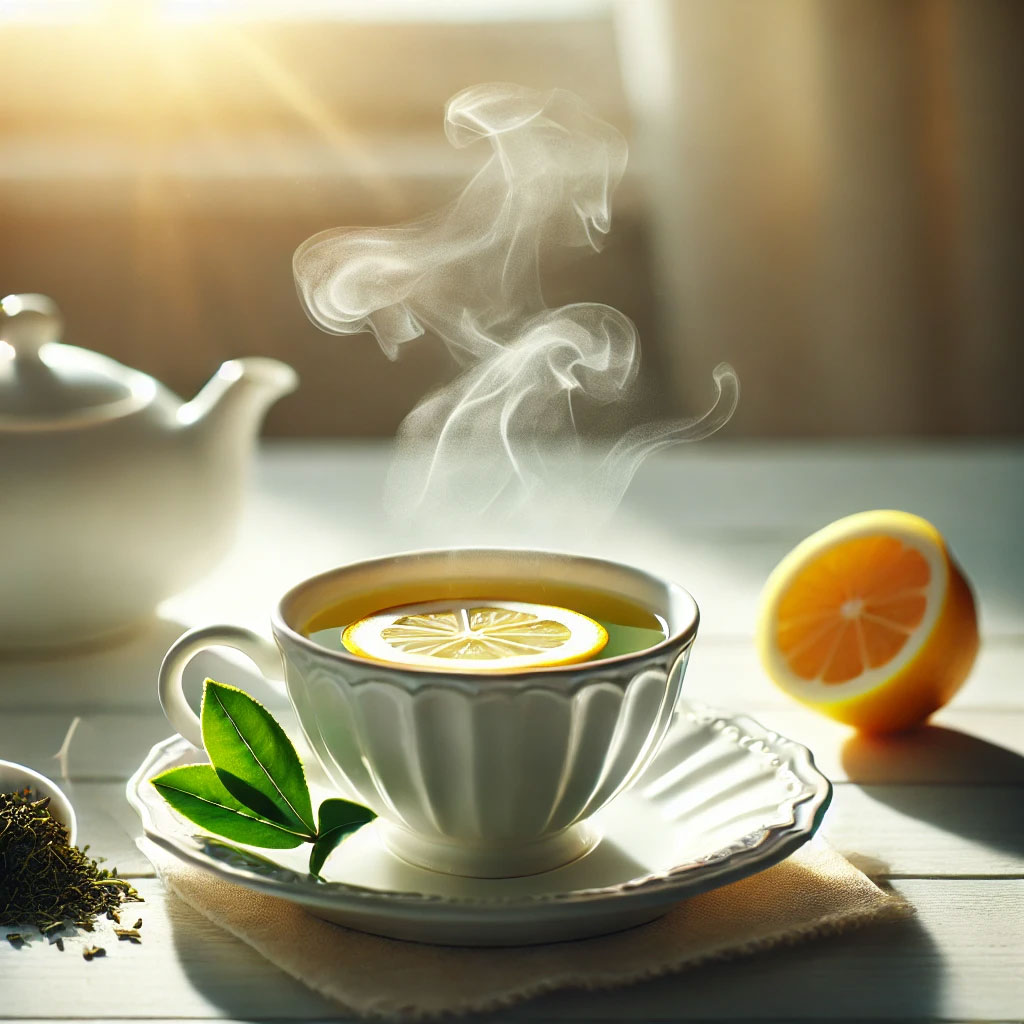
Black tea
Key Bioactive Compounds: Theaflavins and thearubigins
Specific Health Benefits:
- Supports heart health by improving blood vessel function
- Promotes healthy gut bacteria
- Increases alertness and concentration
- Contains compounds that may help lower blood sugar
Considerations: Contains about half the caffeine of coffee (40-70mg per cup).
Herbal teas
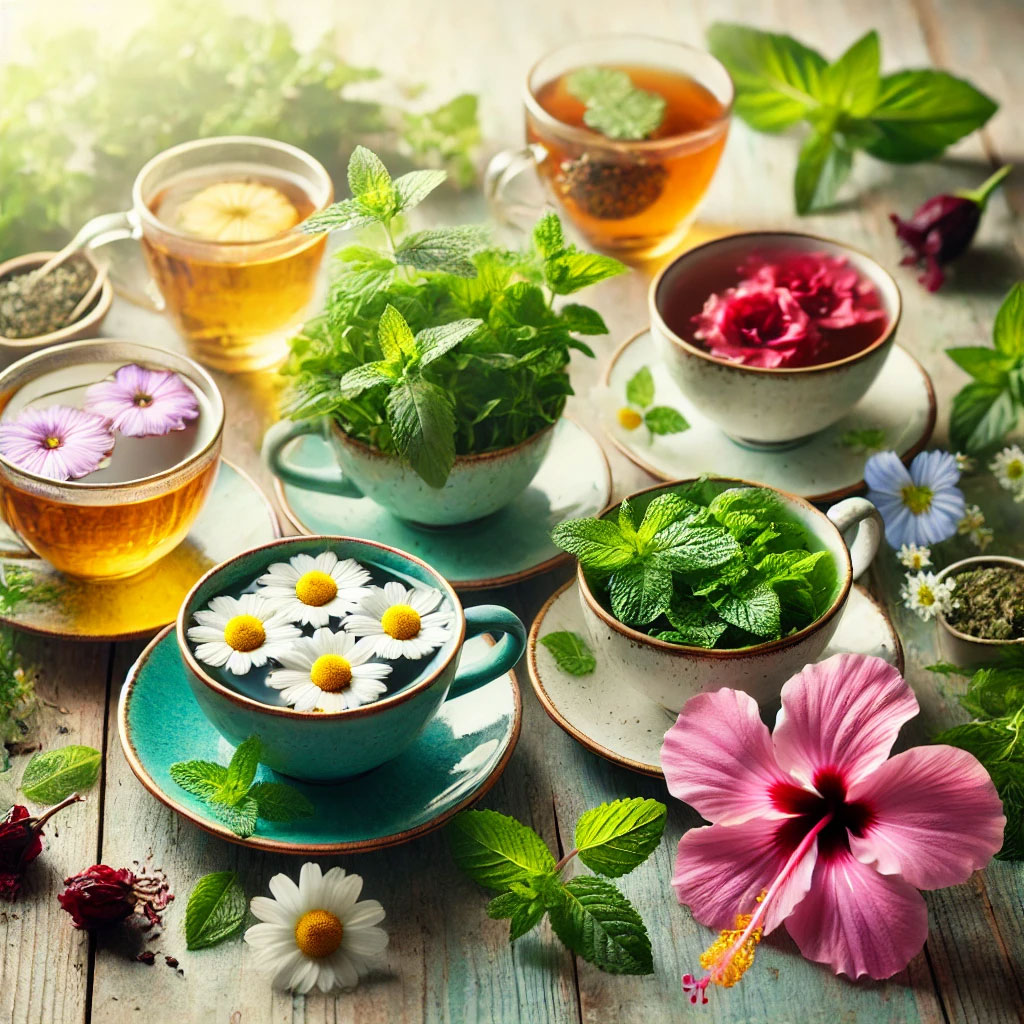
Chamomile Tea:
- Promotes relaxation and better sleep
- Reduces inflammation
- Soothes digestive discomfort
Peppermint Tea:
- Relieves digestive issues and bloating
- Eases headache tension
- Clears sinuses and freshens breath
Ginger Tea:
- Fights nausea and motion sickness
- Reduces muscle pain and soreness
- Supports immune function
Turmeric Tea (Golden Milk):
- Provides powerful anti-inflammatory effects
- Boosts antioxidant capacity
- Supports brain function
Simple Recipe: Heat 1 cup milk (dairy or plant-based) with ½ teaspoon turmeric, pinch of black pepper, and optional cinnamon and honey.
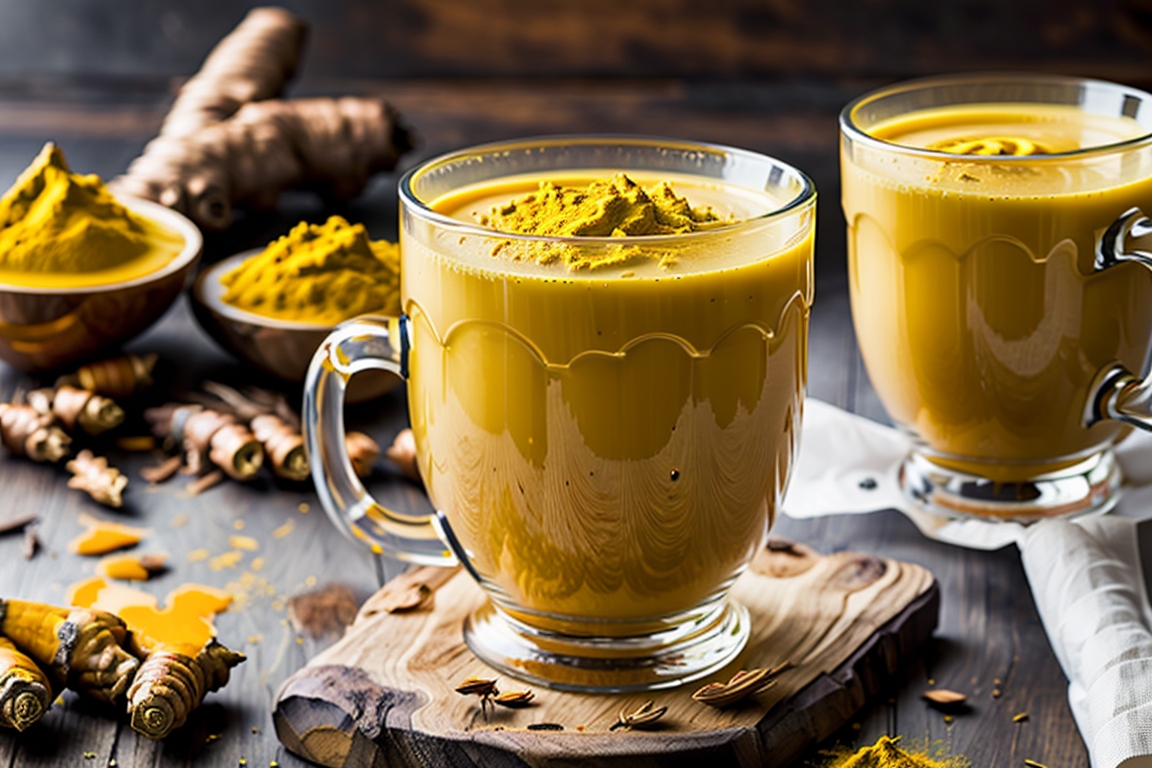
Hibiscus Tea:
- Helps lower blood pressure
- Rich in vitamin C and antioxidants
- Supports liver health
Rooibos Tea:
- Caffeine-free with high antioxidant content
- Contains unique polyphenols that support skin health
- May help balance blood sugar
Oolong tea
Unique Characteristics: Partially oxidized, falling between green and black tea
Specific Health Benefits:
- Supports metabolism and fat burning
- Helps maintain healthy skin (may improve eczema symptoms)
- Contains unique compounds that support heart health
White tea
Minimally Processed: Contains the highest antioxidant levels of all teas
Specific Health Benefits:
- Promotes healthy, youthful skin
- Provides cancer-fighting properties
- Offers antibacterial benefits
Matcha
What it is: Stone-ground green tea leaves consumed in their entirety.
Benefits:
- Contains up to 137 times more EGCG than regular green tea
- Provides calm, focused energy due to L-theanine content
- Supports detoxification processes
Traditional preparation: Whisk 1 teaspoon with hot (not boiling) water until frothy.
Regional tea traditions
Japanese tea ceremonies emphasize mindfulness, creating additional mental health benefits beyond the tea’s chemical properties. Chinese medicinal tea practices often combine herbs for targeted health support.
General Caution: Commercial bottled iced teas often contain 5-8 teaspoons of added sugar per bottle. Choose unsweetened varieties or brew your own.
Tea benefits comparison
| Tea Type | Key Compounds | Primary Benefits | Best Time to Consume |
|---|---|---|---|
| Green | EGCG, L-theanine | Metabolism, focus | Morning/afternoon |
| Black | Theaflavins | Heart health, energy | Morning |
| White | Catechins, tannins | Skin health, antioxidant | Anytime |
| Oolong | Theasinensins | Weight management, skin | Afternoon |
| Chamomile | Apigenin | Sleep, relaxation | Evening |
| Peppermint | Menthol | Digestion, breath | After meals |
| Ginger | Gingerols | Nausea relief, immunity | Morning/when sick |
| Hibiscus | Anthocyanins | Blood pressure, heart | Afternoon |
| Rooibos | Aspalathin | Skin health, relaxation | Evening (caffeine-free) |
| Matcha | Concentrated EGCG, L-theanine | Energy, focus, metabolism | Morning |
The beloved bean: coffee and its complex profile
Caffeine content comparison
| Coffee Preparation | Caffeine Content | Notes |
|---|---|---|
| Espresso (1 oz) | 63 mg | Concentrated but smaller volume |
| Drip coffee (8 oz) | 95 mg | Most common preparation |
| Cold brew (8 oz) | 100-200 mg | Higher caffeine due to brew method |
| Instant coffee (8 oz) | 62 mg | Convenient but less aromatic compounds |
| Decaf coffee (8 oz) | 2-5 mg | Not completely caffeine-free |
Key bioactive compounds
Coffee contains caffeine and over 1,000 antioxidants including chlorogenic acids.
Processing methods and health benefits
Light roasts retain more chlorogenic acids, which support blood sugar control.
Dark roasts contain more N-methylpyridinium, which helps protect stomach cells from acid damage.
Research indicates coffee’s health benefits are most pronounced at 3-5 cups daily, though individual tolerance varies.
Specific health benefits
- Increases alertness and focus
- Improves physical performance and endurance
- Reduces risk of type 2 diabetes by improving insulin sensitivity
- Protects brain health and may lower risk of Parkinson’s and Alzheimer’s
- Supports liver function and may reduce risk of liver disease
Individual variation
Your CYP1A2 gene affects how quickly you metabolize caffeine:
- Fast metabolizers process caffeine efficiently and tend to experience more benefits than risks
- Slow metabolizers may experience anxiety or sleep disruption even with moderate consumption
The “catch”
Impact of Additives: Fancy coffee drinks with syrups, whipped cream, and sugary additions can contain 300-500 calories and cancel out health benefits.
Caffeine Sensitivity & Moderation: Limit intake to 3-4 cups (300-400mg caffeine) daily. Some people may experience anxiety, rapid heartbeat, or sleep disruption with less.
Acidity: May cause digestive discomfort for people with acid reflux or sensitive stomachs.
Healthier ways to enjoy coffee
- Black coffee offers maximum benefits with minimal calories
- Add a splash of milk (dairy or plant-based) for creaminess
- Use cinnamon as a natural sweetener
- Try cold brew for lower acidity
Nature’s sweetness: fruit and vegetable juices
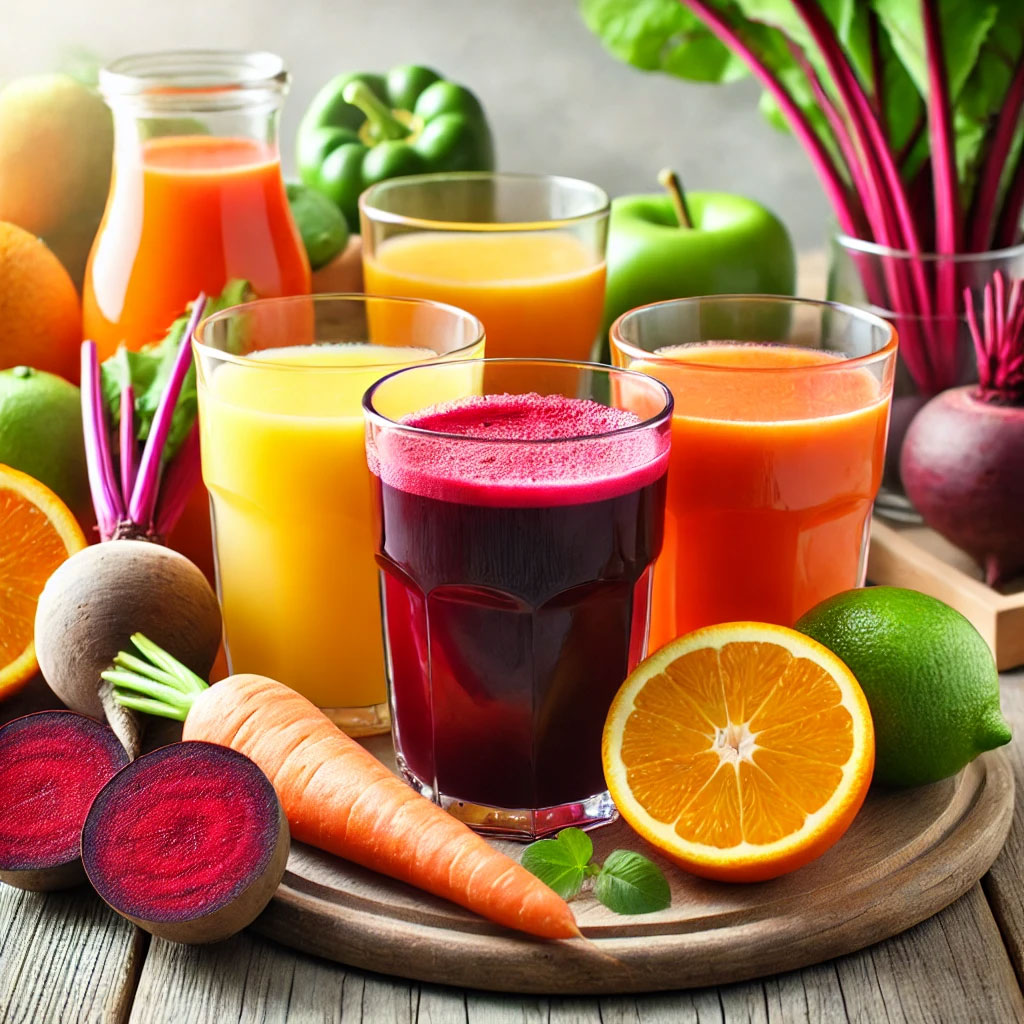
Freshly squeezed vs. commercial juices
Benefits of Fresh:
- Higher vitamin and mineral content
- Preserved enzymes that aid digestion
- No added sugars or preservatives
Downsides of Commercial:
- Often contain added sugars or concentrates
- Pasteurization reduces nutritional value
- May contain preservatives or artificial flavors
Nutrient preservation tips
- Consume fresh juice immediately after preparation
- Store in airtight container to minimize oxidation
- Cold-press rather than high-speed blend to reduce nutrient loss
- Add lemon juice to slow oxidation process
Vegetable juices
Lower Sugar Options:
- Green juice (kale, spinach, cucumber, celery)
- Carrot juice
- Beet juice
Specific Benefits:
- Concentrated plant nutrients and phytochemicals
- Beet juice improves exercise performance and lowers blood pressure
- Carrot juice provides beta-carotene for eye and skin health
- Green juices offer alkalizing effects and support detoxification
Targeted juice combinations
| Health Goal | Juice Combination | Key Benefits |
|---|---|---|
| Immune support | Carrot, orange, ginger | Vitamin A, C, anti-inflammatory |
| Digestion | Cucumber, celery, lemon, ginger | Hydration, enzymes, soothes gut |
| Anti-inflammatory | Pineapple, turmeric, black pepper | Bromelain, curcumin absorption |
| Post-workout | Watermelon, beetroot, lime | Citrulline, nitrates for recovery |
| Skin health | Cucumber, apple, spinach | Hydration, antioxidants, vitamin A |
Fruit juices
100% Fruit Juice (No Added Sugar): Limit to 4-8 oz daily due to natural sugar content.
Sugar content comparison
| Juice (8 oz) | Sugar Content | Glycemic Index | Key Nutrients |
|---|---|---|---|
| Apple | 24g | 40 (medium) | Quercetin |
| Orange | 21g | 50 (medium) | Vitamin C, folate |
| Grape | 36g | 55 (medium-high) | Resveratrol |
| Cranberry (unsweetened) | 10g | 56 (medium) | Proanthocyanidins |
| Pomegranate | 32g | 53 (medium) | Punicalagins |
| Vegetable juice | 8g | 35 (low) | Varies by vegetables |
Specific examples with unique benefits
Pomegranate Juice:
- Three times the antioxidant content of green tea
- Supports heart health by improving blood flow
- May help reduce joint pain and inflammation
Tart Cherry Juice:
- Contains natural melatonin for better sleep
- Reduces muscle soreness after exercise
- Lowers inflammation markers in the body
Lemon/Lime Juice (diluted):
- Provides vitamin C for immune support
- Creates alkalizing effect in the body
- Aids digestion when consumed before meals
Smoothies: the fiber advantage
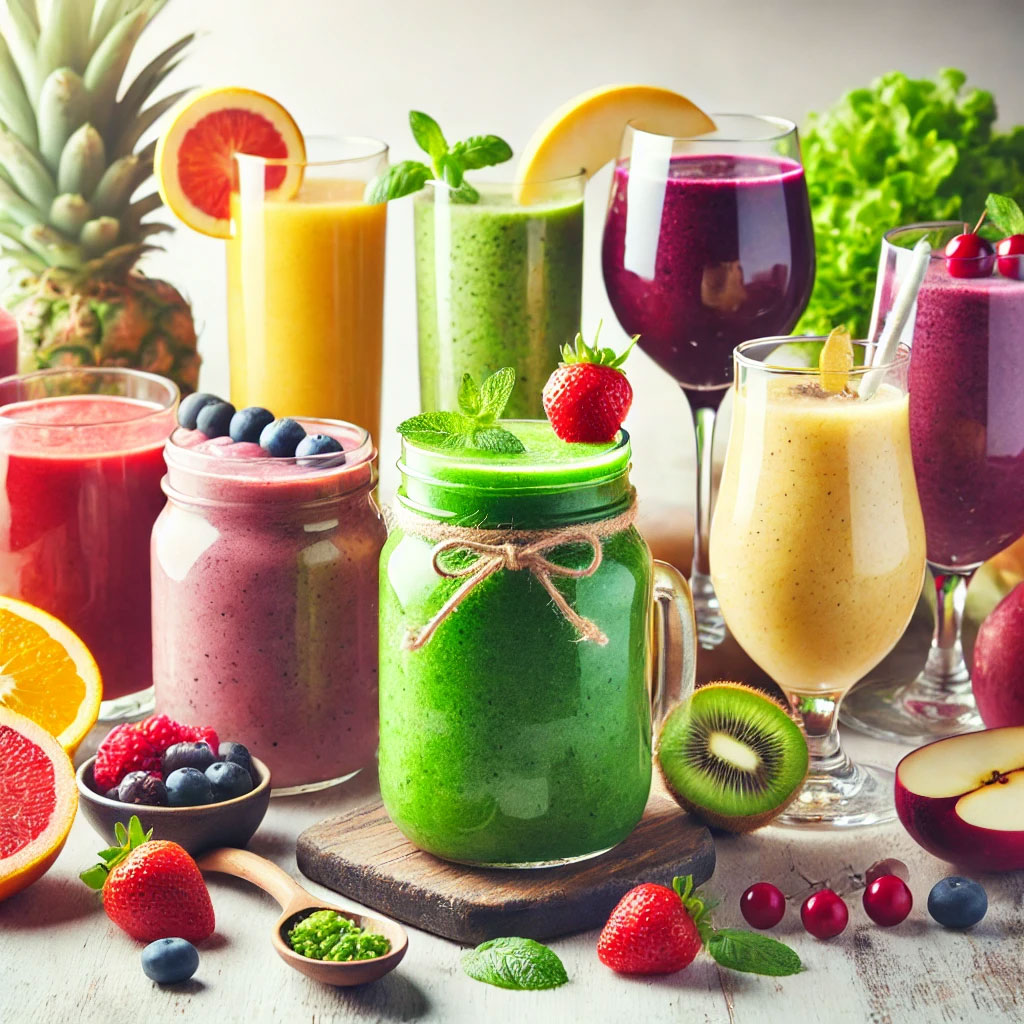
Benefits:
- Retains fiber that juicing removes
- Keeps you fuller longer
- Allows for nutritional customization
Smoothie builder
| Base (1 cup) | Greens (1 handful) | Fruit (½ cup) | Protein (2 Tbsp) | Healthy Fat (1 Tbsp) | Boosters (Optional) |
|---|---|---|---|---|---|
| Water | Spinach | Berries | Greek yogurt | Chia seeds | Cinnamon |
| Almond milk | Kale | Banana | Protein powder | Almond butter | Turmeric + black pepper |
| Coconut water | Romaine | Mango | Hemp seeds | Avocado | Spirulina |
| Oat milk | Arugula | Pineapple | Cottage cheese | Flaxseed | Matcha powder |
| Green tea (cooled) | Swiss chard | Apple | Silken tofu | Pumpkin seeds | Cacao nibs |
Caution: Smoothies can become calorie bombs if loaded with too much fruit, juice, or sweeteners.
Dairy and plant-based milks: calcium and beyond
Dairy milk (low-fat/skim)
Key Nutrients:
- 8g protein per cup
- 30% of daily calcium needs
- Vitamin D (when fortified)
- Vitamin B12, potassium, and phosphorus
Benefits:
- Complete protein source
- Promotes bone health
- Supports muscle recovery
Considerations: Lactose intolerance affects about 65% of the global population.
Plant-based milk alternatives
Always choose unsweetened, fortified versions.
Plant milk nutrition comparison
| Milk Type (1 cup) | Calories | Protein | Fat | Calcium | Key Benefits | Environmental Impact |
|---|---|---|---|---|---|---|
| Cow’s milk (2%) | 122 | 8g | 5g | 300mg | Complete protein | High water/land use |
| Almond | 30-40 | 1g | 3g | 450mg* | Low calorie | High water use |
| Soy | 80-100 | 7-8g | 4g | 450mg* | Complete protein | Moderate impact |
| Oat | 90-120 | 3g | 2g | 350mg* | Beta-glucan fiber | Lower impact |
| Coconut | 45 | 0g | 4g | 450mg* | MCTs | Moderate impact |
| Hemp | 60-80 | 3g | 5g | 300mg* | Omega-3 fatty acids | Low impact |
| Rice | 90-130 | 1g | 2g | 300mg* | Hypoallergenic | High water use |
| Pea | 70-100 | 8g | 2g | 450mg* | High protein | Low impact |
*When fortified. Amounts vary by brand.
Almond milk:
- Lower in calories (30-40 per cup)
- Provides vitamin E for skin health
- Naturally lactose-free and vegan
Soy milk:
- Closest to dairy milk in protein content (7-8g per cup)
- Contains heart-healthy isoflavones
- Often fortified with calcium and vitamins D and B12
Oat milk:
- Contains soluble fiber called beta-glucan that lowers cholesterol
- Creamier texture than other plant milks
- More environmentally sustainable than almond milk
Coconut milk beverage:
- Contains medium-chain triglycerides (MCTs)
- Adds rich flavor to smoothies and coffee
- Use in moderation due to saturated fat content
Hemp milk:
- Contains omega-3 fatty acids for heart and brain health
- Provides all essential amino acids
- Sustainable crop requiring minimal water and pesticides
Key Consideration: Check ingredient lists for additives like carrageenan, gums, and oils.
Fermented functional beverages: gut health and more
Kombucha
What It Is: Fermented tea with a colony of bacteria and yeast (SCOBY).
Benefits:
- Provides probiotics that support gut health
- Contains antioxidants from the tea base
- May help balance blood sugar levels
Beneficial bacteria strains:
- Gluconacetobacter species – produce beneficial acids
- Acetobacter – help create the SCOBY
- Lactobacillus – support digestive and immune health
Simple DIY start:
- Obtain a SCOBY from a trusted source
- Brew sweetened black or green tea
- Add SCOBY and starter liquid
- Cover with breathable cloth
- Ferment 7-14 days at room temperature
Considerations:
- Sugar content varies (2-8g per 8oz)
- Contains a small amount of alcohol (usually <0.5%)
- Home brewing requires proper safety measures
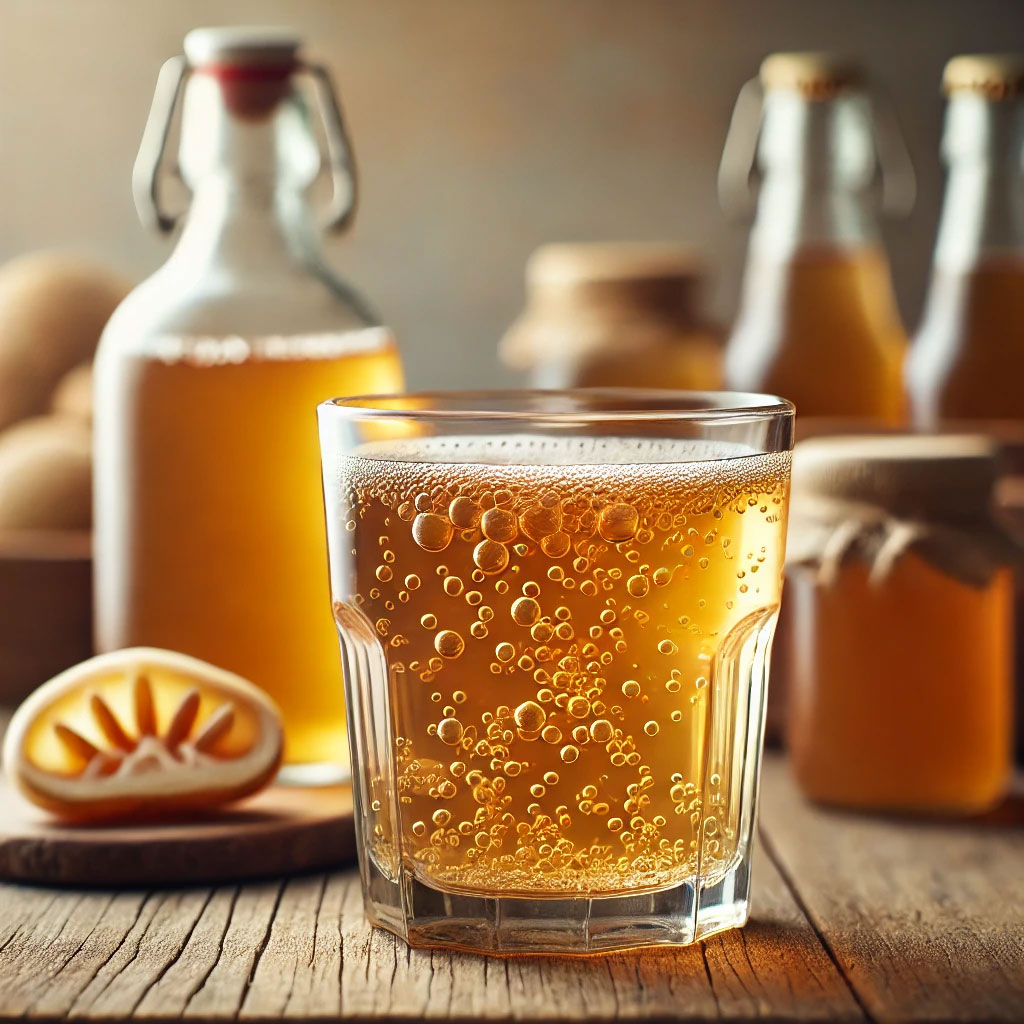
Kefir
What It Is: Fermented milk (dairy kefir) or sweetened water (water kefir) with kefir grains.
Benefits:
- Contains up to 30 strains of beneficial bacteria and yeasts
- More probiotics than yogurt
- Supports immune function and digestive health
- Often tolerated by those with lactose intolerance
Key probiotic strains:
- Lactobacillus kefiri – unique to kefir
- Bifidobacterium bifidum – supports gut barrier function
- Saccharomyces kefir – beneficial yeast that controls harmful yeasts
Traditional Usage: Originated in the Caucasus Mountains, where people living in this region have used kefir for centuries and are known for their longevity.
How to Consume: Drink plain, add to smoothies, or use as a base for overnight oats.
Prebiotic sodas
What They Are: Carbonated drinks with added prebiotic fiber.
Potential Benefits:
- Feed beneficial gut bacteria
- Often lower in sugar than traditional sodas
- Support digestive health
Common prebiotic ingredients:
- Inulin
- Fructooligosaccharides (FOS)
- Oligofructose
Considerations: Check labels for added sweeteners or artificial ingredients.
Specialized & traditional healthy drinks
Coconut water
Natural Electrolytes: Rich in potassium, magnesium, and sodium.
Benefits:
- Hydrates more effectively than water after intense exercise
- Contains about 1/3 the sugar of sports drinks
- Provides minerals that support heart and muscle function
Choose Wisely: Look for 100% pure coconut water with no added flavors or sugars.
Bone broth
Key Components: Collagen, amino acids, and minerals from slowly simmered animal bones.
Potential Benefits:
- Supports gut lining health
- Provides building blocks for healthy joints
- Contains compounds that may reduce inflammation
- Promotes skin elasticity
DIY Basic Recipe: Simmer beef, chicken, or fish bones with apple cider vinegar and herbs for 12-48 hours to extract maximum nutrients.
Chicory root “coffee”
What It Is: Caffeine-free coffee alternative made from roasted chicory root.
Benefits:
- Contains inulin, a prebiotic fiber
- Supports digestive health
- Offers a rich flavor without caffeine
- May help reduce inflammation
Yerba mate
What It Is: Traditional South American beverage made from the leaves of the holly plant Ilex paraguariensis.
Benefits:
- Contains caffeine plus theobromine and theophylline for balanced energy
- Rich in polyphenols and saponins with antioxidant properties
- May help support weight management through metabolic effects
Traditional Preparation: Served in a gourd with a metal straw (bombilla) and often shared in social settings.
Functional wellness shots
Small-volume beverages with concentrated health-promoting ingredients, typically 1-4 oz.
| Shot Type | Key Ingredients | Benefits | Best Time to Consume |
|---|---|---|---|
| Ginger | Ginger, lemon, cayenne | Anti-inflammatory, digestion | Morning or pre-meal |
| Turmeric | Turmeric, black pepper, lemon | Anti-inflammatory | Any time |
| Wheatgrass | Wheatgrass juice | Chlorophyll, detox | Morning on empty stomach |
| Apple Cider Vinegar | ACV, honey, cinnamon | Blood sugar balance | Before meals |
| Elderberry | Elderberry extract | Immune support | Daily during cold season |
Adaptogenic drinks
Beverages containing herbs classified as adaptogens – plants that help the body resist various stressors.
Common Adaptogenic Ingredients:
- Ashwagandha – supports stress response and hormonal balance
- Reishi mushroom – immune support and stress relief
- Rhodiola – energy and mental performance
- Holy basil (Tulsi) – stress management and immune support
Brewing Method: Typically steeped as teas or added as powders/extracts to warm milk or smoothies.
Maple water
What It Is: The pure sap collected from maple trees before it’s boiled down to syrup.
Benefits:
- Contains minerals including manganese, calcium, and potassium
- Natural hydration with subtle sweetness
- Lower sugar content than coconut water
- Supports electrolyte balance
What to limit or avoid for optimal health
Sugary drinks
Regular consumption of sugar-sweetened beverages links to:
- Weight gain and obesity
- Increased risk of type 2 diabetes
- Higher risk of heart disease
- Dental cavities
- Fatty liver disease
Common culprits include: Soda, sweetened fruit drinks, sports drinks, and energy drinks.
Sugar content in popular beverages
| Beverage (12 oz) | Sugar Content | Sugar Cubes Equivalent |
|---|---|---|
| Cola | 39g | Nearly 10 cubes |
| Orange soda | 44g | 11 cubes |
| Sweet tea | 33g | 8 cubes |
| Energy drink | 41g | 10 cubes |
| Sports drink | 21g | 5 cubes |
| Flavored latte | 24g | 6 cubes |
| Fruit punch | 42g | 10.5 cubes |
Artificially sweetened beverages
Research suggests potential concerns:
- May disrupt gut bacteria balance
- Could alter metabolism and blood sugar response
- May increase cravings for sweet foods
Excessive alcohol
While moderate amounts of certain alcoholic drinks (like red wine) may offer benefits, excessive intake causes:
- Liver damage
- Increased cancer risk
- Higher blood pressure
- Weakened immune system
Healthier beverage swaps
| Instead of This | Try This | Benefits |
|---|---|---|
| Soda | Sparkling water with citrus | Zero sugar, natural flavor |
| Sugary coffee drink | Coffee with cinnamon and milk | Lower sugar, steady energy |
| Fruit juice | Whole fruit + water | More fiber, less sugar |
| Energy drink | Green tea or matcha | Clean energy, antioxidants |
| Sweetened iced tea | Cold-brewed herbal tea | No added sugar, hydrating |
| Hot chocolate | Golden milk | Anti-inflammatory turmeric |
| Milkshake | Smoothie with yogurt and fruit | Protein, fiber, less sugar |
| Beer | Kombucha | Probiotic benefits, minimal alcohol |
Making healthy beverage choices: practical tips
Read labels
Check for:
- Added sugars (look for words ending in “-ose”)
- Artificial sweeteners
- Preservatives and artificial colors
- Actual juice content in “juice drinks”
Prioritize whole, unprocessed options
- Brew your own tea and coffee
- Make smoothies at home
- Infuse water with fresh fruits and herbs
Listen to your body
Individual needs vary based on:
- Age and activity level
- Health conditions
- Medication use
- Personal tolerance
Hydration for different needs
For Athletes:
- Water for workouts under 60 minutes
- Electrolyte drinks for longer, intense sessions
- Tart cherry juice for recovery
For Better Sleep:
- Chamomile tea
- Tart cherry juice
- Golden milk
For Digestive Health:
- Ginger tea
- Kefir
- Fennel tea
Always consult a healthcare provider for personalized advice, especially if you have medical conditions.
Quick reference: top drinks by health benefits
| Health Goal | Best Beverages | Why They Work |
|---|---|---|
| Heart health | Green tea, pomegranate juice, hibiscus tea | Antioxidants, anti-inflammatory compounds |
| Weight management | Water, green tea, black coffee | Metabolism support, minimal calories |
| Digestion | Ginger tea, kefir, kombucha | Probiotics, anti-inflammatory properties |
| Immunity | Elderberry tea, citrus juices, turmeric drinks | Vitamin C, antimicrobial properties |
| Better sleep | Chamomile tea, tart cherry juice, warm milk | Melatonin support, relaxing compounds |
| Energy | Coffee, matcha, yerba mate | Balanced caffeine content |
| Muscle recovery | Tart cherry juice, chocolate milk, coconut water | Anti-inflammatory, protein, electrolytes |
| Skin health | Green tea, bone broth, cucumber water | Antioxidants, collagen support, hydration |
Conclusion
The beverages you choose can significantly impact your health. By incorporating a variety of nutrient-rich drinks—from water and tea to fermented beverages and specialized traditional drinks—you can support your body in countless ways.
Small changes make a big difference. Replace one sugary drink with water or unsweetened tea each day. Try a new healthy option each week. Your body will thank you with improved energy, better digestion, and long-term health benefits.
Remember, what you drink matters just as much as what you eat in your journey toward optimal health.
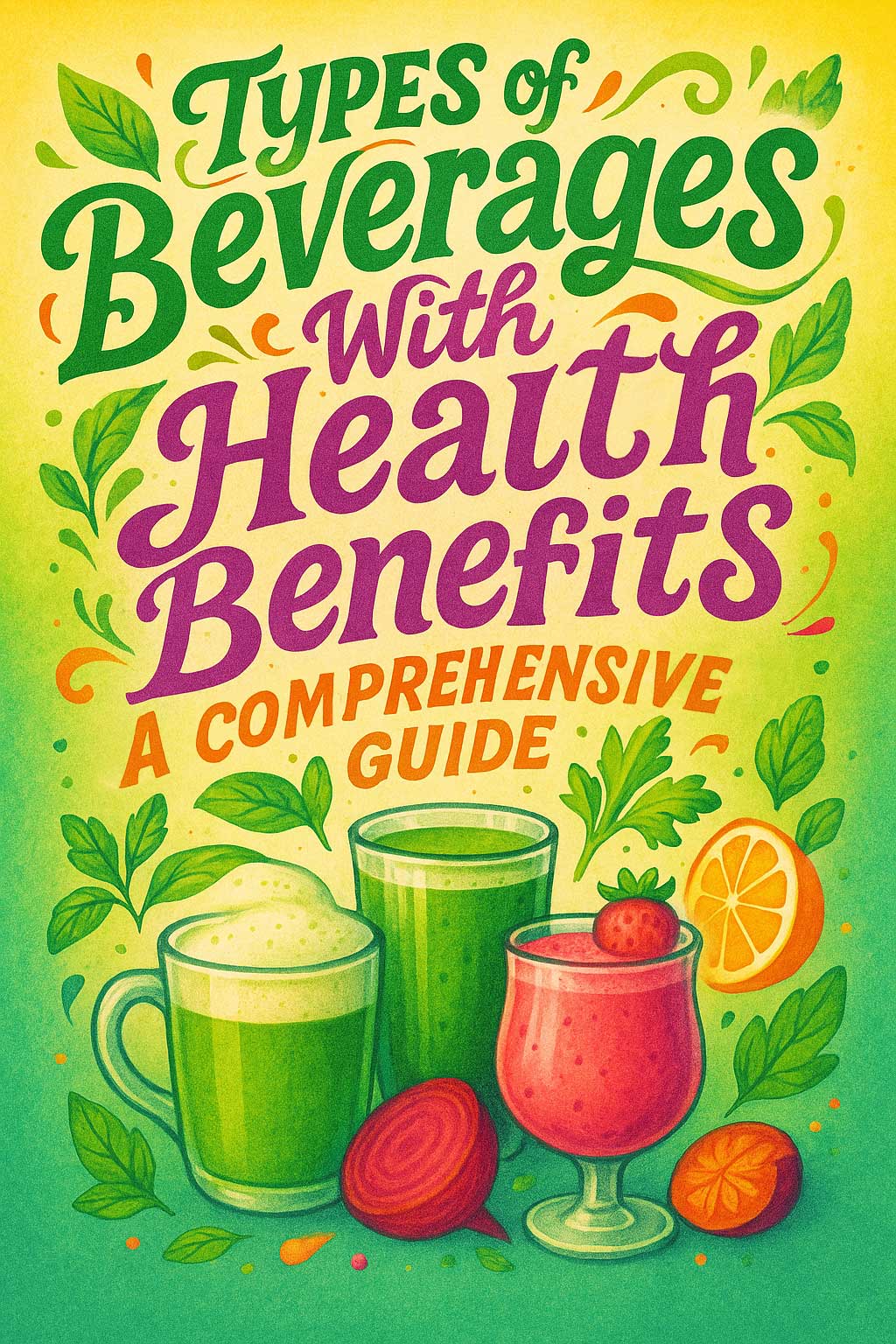
FAQs
What is the healthiest beverage to drink?
Water remains the healthiest beverage choice for most people. It hydrates without added calories or artificial ingredients and supports every bodily function. For additional health benefits beyond hydration, unsweetened green tea offers powerful antioxidants with minimal calories.
What drink has the best health benefits?
No single drink wins the “healthiest” title, as different beverages offer unique benefits. Green tea provides exceptional antioxidant content, while fermented drinks like kefir deliver probiotic benefits. The healthiest choice depends on your specific health goals and needs.
What to drink instead of water?
While water should remain your primary beverage, healthy alternatives include:
- Herbal teas (caffeine-free)
- Unsweetened plant milks
- Infused water with fruits/herbs
- Coconut water
- Diluted vegetable juices
These options provide hydration plus additional nutrients while keeping sugar and calorie content low.
What drink is good for everyday?
Water should form the foundation of your daily fluid intake. Beyond water, unsweetened tea (green, black, or herbal) makes an excellent everyday choice, offering antioxidants and other beneficial compounds with minimal calories. The key is consistency with healthy options rather than occasional consumption.
What to drink instead of tea?
If you’re avoiding tea due to caffeine or preference, consider:
- Herbal infusions (technically not tea) like chamomile or peppermint
- Rooibos (naturally caffeine-free with antioxidants)
- Chicory root beverages
- Golden milk (turmeric latte)
- Warm lemon water with honey
These alternatives provide similar comfort without tea’s specific compounds.
What’s the most unhealthy drink?
Sugary sodas consistently rank as among the most unhealthy beverages. A typical 12-oz can contains 39g of sugar (nearly 10 teaspoons) with zero nutritional benefits. Regular soda consumption strongly links to obesity, type 2 diabetes, heart disease, and tooth decay.
What is the healthiest soft drink?
Traditional soft drinks aren’t healthy, but better alternatives include:
- Unsweetened sparkling water with fruit essence
- Kombucha (lower sugar varieties)
- Prebiotic sodas with minimal sweeteners
- Club soda with a splash of 100% juice
These provide carbonation without excessive sugar or artificial ingredients.
Which juice is good for health?
Vegetable-based juices with minimal fruit content offer benefits with less sugar. If choosing fruit juice, unsweetened tart cherry, pomegranate, and orange juice (in moderation, 4-6 oz) provide the most significant health benefits due to their antioxidant content and specific bioactive compounds.
What is the best thing to drink in the morning?
Warm lemon water makes an excellent morning drink, helping rehydrate after sleep, supporting digestion, and providing vitamin C. Green tea offers gentle caffeine with L-theanine for focused energy, while a small serving of vegetable juice can provide nutrients to start your day.
What to drink instead of juice?
Instead of fruit juice, which lacks fiber and concentrates sugar, try:
- Whole fruit blended with water
- Fruit-infused water
- Diluted juice (1 part juice to 3 parts water)
- Smoothies with whole fruits plus vegetables
- Herbal fruit teas (naturally sweet without sugar)
These alternatives provide fruit flavor with better nutritional profiles.
What to drink before bed?
Caffeine-free options that support relaxation include:
- Chamomile tea (contains apigenin that promotes sleepiness)
- Tart cherry juice (natural source of melatonin)
- Warm milk or milk alternatives with nutmeg
- Valerian root tea
- Passionflower tea
Avoid alcohol, which disrupts sleep quality despite its initial sedative effect.


